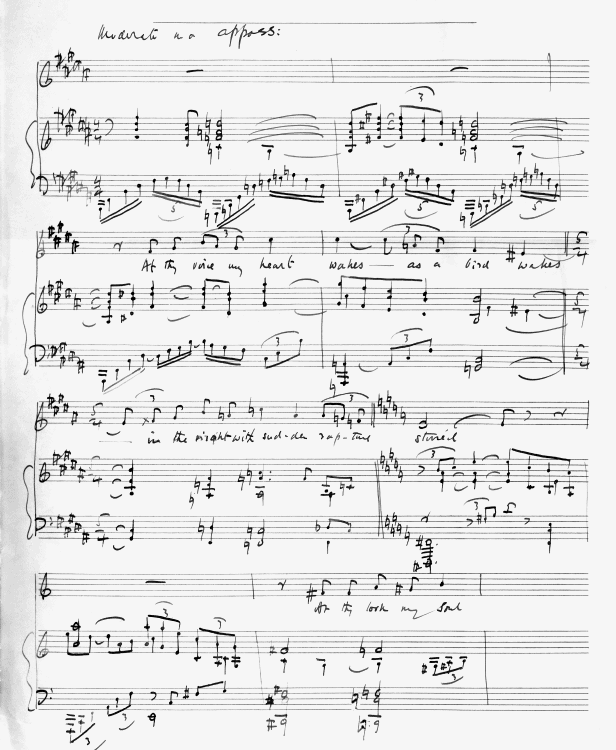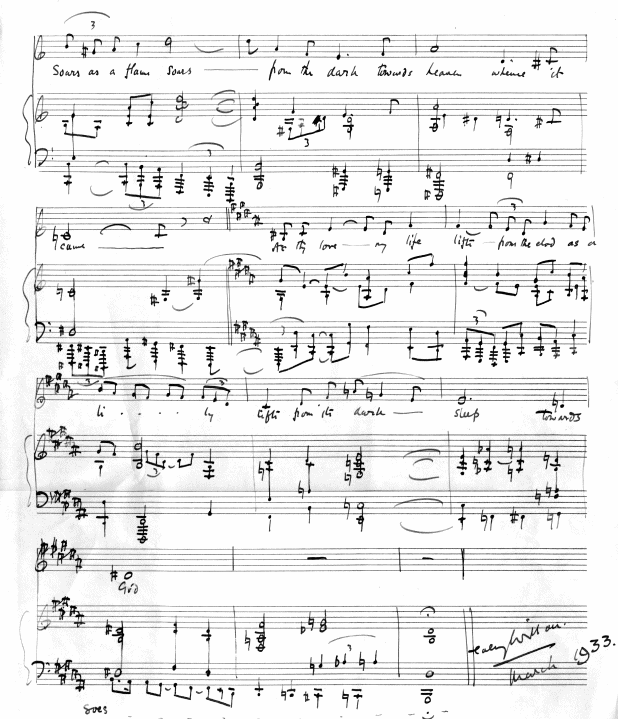|
Charles G.D. Roberts and Healey Willan: a Collaboration By F. R.C. Clarke and R. S. Kilpatrick
|
||||
|
In the Fall/Winter 1978 issue of Canadian Poetry, D.M.R. Bentley published the text of the address delivered by Charles G.D. Roberts on the evening of Saturday, March 18, 1933, to a large gathering of well-wishers and admirers in Toronto.1 Bessie Gowan Ferguson would later describe the affair rapturously in the Toronto Mail and Empire: Youth and age, Church and State, Law
and Letters, Art and the Artless, Institutions and Individuals were all
"Robertsites" on Saturday evening when, at Burwash Hall, Dr.
Charles G.D. Roberts—the Dean of Canadian Letters—was tendered a
national tribute. Among the honoured guests were the Prime Minister, The Right Honorable R.B. Bennett, and the Leader of His Majesty’s Loyal Opposition, the Right Honorable W.L.M. King. The honorary treasurer announced a handsome gift for Dr. Roberts (who certainly needed the money) of one thousand dollars, to which the poet wittily responded: "A prophet is not without honor or profits in his own land."3 Among the many tributes to Roberts that evening was a performance by the well-known baritone and music educator, James Campbell McInnes, who was "enthusiastically applauded when he sang Roberts’ poem ‘At Thy Voice My Heart Wakes,’ set to music by Dr. Healey Willan."4 (The accompanist was probably not Willan himself, or the fact would have been noted.) "At Thy Voice My Heart Wakes" had been published originally in The Century Magazine for 1898,5 and reprinted in Poems, 1901/07. Roberts included it once more in Selected Poems, 1936.6 Its original title, in fact, had been "A Song." As a miniature gem of Roberts’ verse, it is very formal in its diction and meter. Its length and form may have been factors in the poem’s selection by Willan: three four-line strophes with rime, anaphora, and strict metric and verbal correspondence. At Thy Voice My Heart
Full strophic correspondence extends through line 10 (strophe 3), with lines 11 and 12 showing metrical variations. In classical terms it scans as follows:
Roberts uses his rhythm expressively, beginning and ending strophes with slower lines enclosing the light rapid lines of waking, soaring and lifting. The concluding simile of the ‘lily lifting from the clod’ (11-12) receives an appropriate ritardo through slight metrical expansions, including the added spondee in line 12. The rhyme pattern (abcb) remains consistent throughout each strophe. "At Thy Voice" is closely related by theme, sentiment and imagery to Roberts’ elegiac love poems of 1897-1898, including those published (or re-published) in a collection of that same year, New York Nocturnes.7 Especially close are "A Nocturne of Consecration" (lilies, night, love, sleep, uplift), "A Street Vigil" (uplift, sleep), "In the Solitude of the City" (love, night, sleep), "A Nocturne of Exile" (love, night, sleep), "A Nocturne of Spiritual Love" (lilies), and "A Nocturne of Trysting" (soul as flame, body as flower). The autograph musical score of Healey Willan’s setting of this poem is to be found with the Healey Willan Collection (B748) in the National Library of Canada.8 There is no evidence that it has been performed since 1933. Song-writing was of course one of Willan’s major areas of compositional endeavour. He wrote or arranged over 200 secular songs, of which some 110 are original art songs. Willan once stated his credo as a song composer: "[s]ong should be idealized speech."9 A melody, in the ordinary acceptance of the word meaning tune, is not the most appropriate form for a song, but the natural accent of the words should be given their normal accent in
the voice part somewhat after the manner of a recitative, while the accompaniment furnishes an emotional or atmospheric background. A more suitable title would be "Tone poem for voice and piano." A miniature "tone poem" could well describe Willan’s short setting of "At Thy Voice My Heart Wakes." The accompaniment, while ostensibly for piano, is almost orchestral in style, as if Willan had Richard Strauss in mind. Its harmony is very chromatic, especially when compacted into such a short space. (The period of the 1930s was the time when Willan reached his farthest extremes in his explorations of chromaticism, particularly in his secular music.) The voice part, written in the baritone or mezzo range, displays Willan’s careful attention to the setting of the text in a sort of "speech rhythm" declamation, with an influence, perhaps, of plainchant. The song is "through-composed"; that is, there is actually no
repetition of music for any, or any part of the three strictly-metered, closely corresponding verses of Roberts’ poem. Nor is there any "tune" as such, the vocal line and the accompaniment melding into a single expressive unit to reflect the mood of the words: rapture, adoration, and heavenly love. |
||||
|
Notes
|
||||
|
The authors are grateful to Queen’s University colleagues Dr. Tracy Ware and Dr. Les Monkman for reading this paper and for their generous and encouraging comments. |
||||
|
||||
|
|


